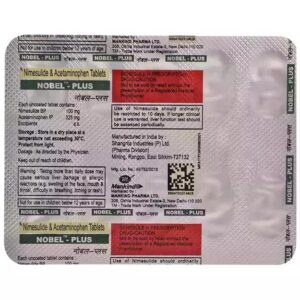NIMESULIDE + PARACETAMOL
Nimesulide: Nimesulide is a nonsteroidal anti-inflammatory drug (NSAID) that is commonly used to relieve pain and inflammation. It belongs to the class of selective COX-2 inhibitors and is available in various forms such as tablets, suspension, and gel.
The primary use of Nimesulide is to alleviate symptoms associated with conditions like osteoarthritis, rheumatoid arthritis, and acute musculoskeletal disorders, such as sprains and strains. It works by inhibiting the production of prostaglandins, which are chemicals that cause inflammation and pain in the body.
The recommended dose of Nimesulide may vary depending on the age, weight, and condition being treated. Generally, the oral dosage for adults is 100 mg twice a day, while for children, the dosage is adjusted based on their weight. However, it is always advisable to follow the specific instructions provided by the healthcare professional or mentioned on the packaging.
As with any medication, Nimesulide can have certain side effects. The most common side effects include gastrointestinal disturbances such as abdominal pain, indigestion, nausea, and diarrhea. In some cases, it may also cause allergic reactions, skin rash, dizziness, headache, and fluid retention. Serious side effects like liver toxicity have rarely been reported but can occur, especially with long-term or high-dose use.
It is important to note that Nimesulide is contraindicated in certain populations, including individuals with a history of liver disease, gastrointestinal ulcers, bleeding disorders, and severe heart failure. Additionally, it should be used with caution in patients with renal impairment, asthma, and in the elderly.
To ensure safe and effective use of Nimesulide, it is recommended to consult with a healthcare professional who can weigh the risks and benefits based on individual circumstances and medical history.
Paracetamol: Paracetamol, also known as acetaminophen, is a widely used over-the-counter medication to relieve pain and reduce fever. It belongs to the class of drugs called analgesics or painkillers.
Paracetamol works by inhibiting the production of prostaglandins, which are chemicals in the body that contribute to pain and inflammation. It primarily acts on the central nervous system, reducing pain signals sent to the brain.
The usual recommended dose of paracetamol for adults is 500-1000mg every 4-6 hours, with a maximum daily dose of 4g (4000mg). The dose may vary for children, depending on their age and weight. It is available in various forms like tablets, capsules, liquid suspension, and soluble tablets.
Paracetamol is commonly used to alleviate headaches, toothaches, muscle aches, backaches, and common cold symptoms. It can also be used to reduce fever associated with illnesses such as influenza.
While paracetamol is generally considered safe when used as directed, it can have side effects, although they are infrequent. Common side effects may include nausea, stomach pain, and skin rash. In rare cases, it may cause a severe allergic reaction. Long-term, excessive use of paracetamol can lead to liver damage, so it is important to follow the recommended dosage and not exceed the maximum daily dose. It is advisable to consult a healthcare professional before taking paracetamol, especially if you have other medical conditions or are taking other medications.

